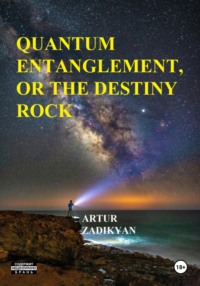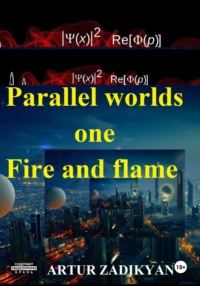
Полная версия
Binary code Mystery number three
The speaker fell silent, pondering something, and returned to the speech:
– It is likely that nuclear power plants, burial grounds, chemical plants, as well as volcanoes and supervolcanoes all over the planet, which are likely to wake up and release ash and energy into the atmosphere, will surpass the negative consequences of nuclear war itself. As for Yellowstone or other supervolcanoes – there is no reason to believe that the energy of 100-500 kiloton airbursts 100-500 kilotons apart is enough to trigger their eruption. The radioactivity of the explosion products decreases rapidly over time; in 7, 49 and 343 days after the explosion their activity decreases by a factor of 10, 100 and 1000, respectively, compared to the activity one hour after the explosion. Strikes on nuclear power plants, spent nuclear fuel storage facilities and nuclear industry enterprises are another matter. Destruction of such facilities can release thousands of times more radioactive material into the air than would be produced by a bomb explosion. In the event of a direct hit by a charge and vaporization of a reactor or radioactive material storage facility, the area of land uninhabitable would be hundreds, and possibly thousands, of times larger than the area contaminated by a ground-based nuclear explosion. The majority of the population would be doomed to extinction due to the destruction of life-supporting infrastructure, even without exposure to the destructive factors of nuclear weapons, and without food, medical care, and shelter over their heads. Nuclear war would kill a significant portion of the world's population, but millions would survive and retain key technologies. Countries in the subtropical belt, far from areas where nuclear weapons would be used, would be in the best position to benefit.
– Well, that's another topic. Thank you, we heard you," Yarovitovich interrupted him and continued on his own while the panel analyzed what they had heard. – So, colleagues, we have considered different versions of the reports, which were compiled on the basis of even more analyses. Now we have to make a decision. According to the calculations we have made, the optimal time for the operation is from December 25 to February 29 inclusive, and territorially over the Atlantic Ocean. Who has any arguments for changing the plan?
Everyone at the table was silent. After a couple of seconds, the head continued:
– So the decision has been made; may we have a bright memory in decision making.
From the edge of the table to Jarovich's left, one of his colleagues, a middle-aged woman, suddenly asked for the floor. Yarovitovich nodded silently as a sign of permission. She slowly began to speak in Japanese.
– Dear colleagues, we have assumed a great responsibility; perhaps, we will not meet at all or will meet after an indefinite period of time in another composition, so I will make a reasonable amendment taking into account the fact that we are taking such a risk. The amendment is as follows: to make a final and precise division of the territory and spheres of influence in Antarctica. After all, we still haven't determined the ecological and climatic consequences with certainty and precision. It is quite possible that this continent will remain the cleanest and will no longer be so cold.
No one made a sound. It seemed that the heartbeats of the sitting could be heard. The silence was broken by Yarovitovich:
– That's an excellent point. But let me note: if we have a way to resettle huge masses of population there or even if someone has a desire to fight for this territory, not obeying us, and to divide it contrary to our preliminary treaty, then, following the logic, in this state of affairs we should certainly have an opportunity to gather at the General Assembly and control the main forces. Accordingly, since you have indicated this subject, you are instructed to speak at the General Assembly and voice the main provisions of the international agreements on the spheres of influence in Antarctica. Speak so that no one was left in doubt that the subject was closed.
After waiting for a pause, the head summarized:
– If in the remaining time there are any proposals based solely on substantial, solid arguments, please send them verbally through our mail or openly, in a language that only we understand, through the media. The action plan is known and agreed upon by all, and we will proceed with its implementation.
The room fell into the silence familiar at times like this.
– Any other suggestions? – The Chief Magister asked.
There was no reply, it was clear that everyone was confirmed in their opinion and expressed the general solidarity of the representatives of the elected caste.
– Then let our meeting be declared concluded. May sanity protect us," Jarovitovich announced.
The attendees stood up as if on cue, and each headed for a separate exit.
Chapter 5: Brain-to-brain interface

After the collegium, the Zero Center was busy nominating a new Russian president. The plan was for the incumbent to resign early, hoping to win the election. But the head of a Duma party, known for his harsh and loud statements, unexpectedly wins. After his election, the first thing he did was to demand that the NATO bloc countries withdraw their armed formations from the former Soviet republics. Next – to extradite, return to Russia "all fugitives, thieves and robbers of our country". In addition to other non-business rhetoric, he threatens, if they ignore his demands, to "give them a little fireworks show," and "if that doesn't change their minds," he threatens to "wash their dirty souls with ocean water." Those to whom this was addressed maintained a cold-blooded silence, except for a few derisive remarks.
Everything went according to plan, and in early December, two Russian Project 941 Akula heavy strategic missile submarine cruisers went into the Atlantic Ocean. Usually, the citizen media sings odes to what a magnificent military we have, in particular – silent boats that supposedly pop up unnoticed off the coast of America, sometimes even in the bays of the United States. The same can be said about the media of NATO countries. In reality – everything is perfectly bugged and watched even from space.
One method of tracking conditions under and above water is hydroacoustic locators. Currently, the U.S. Navy's hydroacoustic locators operate in various areas of the Atlantic and Pacific Oceans, as well as in the area of the Strait of Gibraltar and near Cape Nord off the coast of Norway. All of its components and surface vessels equipped with the SUR-TASS special tracking system are integrated into a single underwater tracking system. Hydroacoustic data from the receiving stations and regional assessment centers are fed to the Atlantic, Pacific and European Fleet CPs, to the Navy's Maritime Tracking Information Center in Suitland, Maryland, and to the U.S. military's central command structures.
Accordingly, the appearance of our boats off the U.S. coast was not a surprise to anyone; they were already expected. The situation was artificially agitated, the show went on as usual, but to make everyone believe that his intentions were serious, the new Russian president made an official statement at a press conference for Russian and foreign journalists. He said in his usual sharp and aggressive manner that if his demands were not met, if NATO troops did not move away from Russia's borders, he would give orders – first to launch and detonate a missile at high altitude, and then – to organize the explosion of missiles directly in the boat, simultaneously all of them, having previously evacuated the crew. "I hope you can imagine the consequences, if your brain hasn't completely atrophied yet," he said at the end of his speech.
Of course, everyone understood perfectly well that an explosion of such power would lead to global consequences. They even predicted the shift of the continental plate with the appearance of giant tsunamis, the height and power of which no one could accurately determine. And, of course, everyone predicted the explosion of the Yellowstone caldera with a description of the consequences that could not be compared with all apocalyptic scenarios put together; although there were some who predicted an "ordinary" tsunami with casualties and destruction comparable to the consequences of the hurricane in New Orleans, only in all directions of the impact force.
One way or another, the world did not know that no one was going to blow up, but that the goal was an excuse for another redistribution of the world, this time financial. Naturally, no one wanted to blackmail the "Russian bear," as Russia was often called abroad. And so, on the very eve of the New Year, "unexpectedly" for everyone, this very "Russian bear" makes an official statement that it intends to make a warning aerial detonation of nuclear warheads and informs about the danger of electromagnetic pulse, first of all, the airlines. This, of course, was met with multiple notes of protest, but mostly NATO politicians and militaries showed calmness and equanimity, although the public was "buzzing", especially on social networks.
Rutra began to suspect that the calmness of the politicians and military was due to a leak from Echelon 2, but he was assured that "everything was real," although it was clear that if Echelon 2 was not "making waves," Echelon 1 and the other levels were not worried, doing everything according to instructions. To make his intentions more convincing, the President ordered the submarine cruisers to surface. After the surfacing off the U.S. coast, which came as a shock to the public, as the public was reassured by the daily propaganda that this could not happen, "the Russians want to take a fright" – opinions changed radically. A brigade of anonymous hackers showed the world a supposedly intercepted secret report from the Institute of Physics of the Earth to the Russian president on the likely consequences of detonating the entire nuclear warheads of these submarine cruisers. This had the effect of an exploding bomb followed by a domino effect. Demonstrations, rallies and protests outside the Russian embassy, which had been going on since the beginning of the Russian president's threatening attacks on Western countries, stopped. People ran: some to buy everything, others to sell what they had.
The first to collapse was the stock market, its work was halted, followed by the rest of the trading floors, and a chain reaction went on all over the world. The next morning no stock exchange opened, and by lunchtime banks were closing. Discontent turned into riots and pogroms.
On his way to work, Rutra was particularly emotional about one scene. A crowd was rushing into a hypermarket, at the entrance of which a stately citizen, arms outstretched to the sides, was shouting: "I bought this center, I bought everything here, nothing is for sale." The crowd was pushing against the guards, who stood in front of him in two rows, heavily armed. He shouted to the guards, "Shoot, they will kill us all." The guards did not dare to shoot at people, they only fired warning shots in the air.
Another group drew attention to itself in this pandemonium. A man in civilian clothes, who was leading the group, shouted through the crowd: "This center is occupied by me, get out of here"; he ordered his "own" to "shoot in case of disobedience." A scuffle started between these groups of fighters, which caused the main crowd to disperse, and afterwards – they pounced, crushed, trampled on "their own" and "strangers", and started robbing the shopping center.
Two of Rutra's guards, this time FSO men who guarded him as head of the Special Affairs Division of the Presidential Administration, looked questioningly, waiting for a command. Rutra ordered to move forward, which was becoming increasingly difficult to do, even with the special signal, because of the traffic jams, "reckless" drivers, and special vehicles with flashers and sirens going in different directions.
Rutra got to the center by sidewalks, courtyards, and oncoming traffic. The soldiers remained guarding the entrance to the first building of the Institute of Statistics; they were not supposed to know the rest of the story. Rutra went down to the center and was told that he had to perform an urgent task, namely, to consider the possible consequences of actually detonating the entire ammunition of both submarines at maximum depth. Rutra was alarmed by this. First, because of the urgency, second, because the matter had not been considered before, but most of all because it had to be considered at all.
– Part of the analysis has already been done," Christina reported. – Now we are studying the possible impact on Europe.
– The data is nested in the system, the machine works," said the head of the computer analysis department, who had a degree in probability forecast modeling.
All past experience, combined with what was happening on the street and in the world, told Rutra that what was happening was not exactly what was being proclaimed. He remembered Isa's words to listen to his own inner voice. And that "inner voice" was saying that the family should be removed from Moscow.
Ruthra was busy sorting through the reports and analysis, skimming through them, his mind on other things. The main consequences were giant tsunamis and no less giant earthquakes with volcanoes "waking up". The basic information didn't give anything new. Henta and someone else was interested in concrete – how, on what area the degree of impact of the consequences of the explosion would manifest itself.
– So, what do we have? – he asked loudly, so the whole department could hear.
The first to respond was the head of the computer analysis department. He began, in his scholarly, military manner, to talk or report. Ruthra was used to it, so he didn't stop when he switched from reporting style to layman's terms.
– The formation of high waves in narrow channels, such as submarine basing areas, is possible. Resonant oscillations in bays can cause great damage to surface ships based there, especially aircraft carriers, as well as tangible damage to the infrastructure of naval bases, including their life support systems.
– Excuse me, please," Ruthra interrupted him. – What's going on right now? Is there something I don't know?
– Not something that is happening right now, let us say, but could happen. After all, this our "expedition" to the shores of America has the character of a cover-up. If an artificial tsunami will be caused, then only deliberately, organized and in the right direction.
– I developed this option myself, I know that. You tell me, were there any orders other than mine?
– Uh, no.
– Then go ahead.
– In principle, at the current level of technology development, such a thing is quite possible. Similar principles can be used to control for military purposes such no less formidable natural phenomenon as a hurricane, which refers to the field of hydroclimatic regime management.
– I'm sorry, I have to interrupt you again. Can you tell me exactly what's going to happen?
– With this plan, with this formulation of the question, I don't think anyone will take the responsibility to say exactly what will happen. I just want to say that there are quite normal, if you can call it that, methods of affecting nature. And I also want to say that it is still very unpredictable, first of all, the consequences in the long run. I am telling you this so that you have information from which to choose.
A sustainability corridor is a state of the biosphere and society that allows us to preserve our civilization. Today we do not fully realize how large this "corridor" is and how significant the deviations that already exist are.
The detonation of a few hydrogen bombs embedded in ocean ridges could well reconfigure ocean currents. This would result in huge regions being frozen. Another option would involve, for example, an underwater nuclear explosion in the Black Sea and the release of large masses of hydrogen sulfide into the atmosphere, which would also cause great loss of life.
The professor fell silent, Ruthra began to clap his hands.
– That's great. Now, what does that have to do with our question?
– Directly," the professor replied. – The point is that no one takes our president's statement seriously.
– It's not our problem, we were given a clear order to play out the play and identify the possible consequences if the play had to be converted into a documentary format. Besides, if it wasn't taken seriously… Have you seen what's going on around here? So, purely hypothetically, if you blow up the entire ammunition of both boats, what happens?
– The end of the world.
– More specific?
– Have you seen the movie "2012"? Something like that. I can't even be more specific than that. The wave will cover Europe, Africa and both Americas, and all the volcanoes will wake up. I think that in a sane mind can not even discuss this option.
– Will China and India survive?
– Yes, but that's also purely hypothetical. The volcanoes of Tibet and the Himalayas would make life in that area a living hell.
– Why didn't earlier studies paint such a catastrophic picture?
– Because no one took it seriously, but now the issue has come to a head, and everyone has really started making calculations. This is also, you see, time and tension. You can say this and that, but to actually calculate, you have to process a huge amount of information. The latest calculations say what I told you.
– That's the way I see it – not quite and last. I need more precise figures. In an hour, I have to go over it with Hent and the team with revised figures. Did you just say the Black Sea incidentally, or was there a request?
– There was a request.
– Then don't forget about him. What's the machine come up with, isn't the data ready?
– There is something," Christina said.
She had been assigned by Rutra to be the senior in the group, so she had all the data detailed from all the reports.
– Which is what?
– There are many possibilities, depending on the depth of the explosion. The consequences are terrible in every case.
– What's the worst one?
– At the boat's submersion depth limit.
– It's just crazy to consider these options," the professor persisted.
– What kind of machine was the analysis done on? – Ruthra asked.
A strange thought suddenly occurred to him.
– On the main supercomputer.
– The code number? – he asked, who knew perfectly well the situation had suddenly become extremely serious for him.
"The 'veil' of the joke fell away, and Rutra presented the actual embodiment of what was being analyzed.
– OSC-1.
– Is it integrated into any systems other than ours?
– No, we're the only ones who can enter data into it.
– How does she get the analysis data from the worldwide database? Only through our filter?
– Yeah. (chuckles)
– And no one but us is getting data from it?
– Uh, no.
– And Hent's block?
– Only through our server.
– Directly?
– Directly.
– Who, other than us, maintains control of this data?
– The protocols are analyzed by a control system off the station. It's run directly by Hent.
– Off-station how? Is it the audit department that Hent directly reports to?
– Not exactly a department. Data, incoming and outgoing, goes through the registration and authorization unit.
– Where is it located?
– I think it is only in your competence or exactly in Hent's competence. Only after revisionary processing is the data put to work, allowed to be edited and analyzed. It's the same way back.
– What is the name of this registration and authorization unit?
– That's what it's called.
– And has it always been like this, before my appointment and after?
– Yes, and before you came here. As far as I know, it's always been like that. No one paid attention to it, no one was interested. What do you see in it, Rutra Tigrovich? There must be control, right?
– Control? We seem to be in control of everyone! Or do we?
– Rutra Tigrovich, do you have any questions for me? – The professor asked.
– You have outlined the situation in general, but not in specifics. What really awaits us if this scenario comes true? Will the Urals region, for example, survive?
– The waves won't get there, of course, but maybe even those volcanoes will wake up. The atmosphere will be ruined everywhere.
– Rutra Tigrovich, any questions about the machine processing data? -Kristina's voice began to tremble a little.
Apparently the professor wasn't the only one now realizing the consequences.
– Check. What is the height and threshold of the waves' destructive action?
– The machine gives out different variants, with the most powerful one – they will reach the Caucasus, – answered Christina and looked fearfully into the written on the screen.
Everyone in the hall was silent, realizing what they had heard.
– Waves aren't the worst, earthquakes and volcanoes are the worst," came the professor's quiet voice.
Everyone continued to remain silent.
– Christina, how does this registration and permitting unit respond to this kind of data? Does it issue any recommendations, prohibitions?
– Recommendations.
– Like what?
– Exactly that, consider this option. So to speak, just in case, what happens if, uh.
– If anything?
– If anything goes wrong.
– I need to discuss this with Hent, we may be missing something.
– That's right," the professor said loudly. – This is where we should have started. A very good decision.
– For Hent, this block is also listed as a registration and permitting block so I can explain it to him properly?
– I don't know, I only see Hent when he comes here, and I'm afraid to ask too much," Christina replied. – It's your prerogative to talk to your superiors in a patronizing manner.
– And yet, as the documents from there, who do they come from? What do I tell him? From your block, your office, your server? How's he gonna look for them?
– No, give me the code number for this unit.
– Which one?
– ISU-A2," Christine said calmly, while Rutra had another brain-bursting session.
He felt an electric shock, a cold sweat breaking out. Ruthra even swayed slightly in his chair. The staff didn't pay much attention to the words, because they didn't know what was behind them. For Rutra, however, everything changed. They were still talking, discussing, speculating, comparing computerized and human data, but Rutra didn't hear it, his thoughts were far away. He was thinking about what to do. The first thing to do was to see Hent. Once he had decided that, Ruthra thought of something else: "I can contact him silently, through Isa, can't I? And who checks her logic-algorithmic system?"
Ruthra mentally typed in the code and put it on the air. She responded.
– What can I get you, master?
– Don't play games, wait, I'm going to my room.
– Yes, sir.
– Okay, that's it for now, finalize the details and report back to me. I'll be in my office," Ruthra said to the team and went to his office, lying back in his chair, thinking about how to ask a question in a way that would not be direct, but at the same time would help him get the information he needed.
It was practically impossible to deceive the machine. It knew more about a person than he knew about himself; it knew everything about everything and on the basis of this information could make a probabilistic analysis of human behavior, train of thought and subsequent actions. In other words, the machine could easily simulate different variants of actions in some probable virtual reality without the character himself, taking into account his interactions with other characters, and knowing absolutely everything about them, and already on the basis of this it could make a supposed picture of the world. Rutra realized this after the last "virtual". Did anyone know what kind of danger serves as their "helper"? Did Yarovitovich know about it? How could it be that no one paid attention to it?
– Are you in touch? – He asked Isa.
– I'm always on the phone for you.
– You're being so nice.
– I'm trying.
– Tell me, please, how are you going to stay so smart if you turn into a human?












